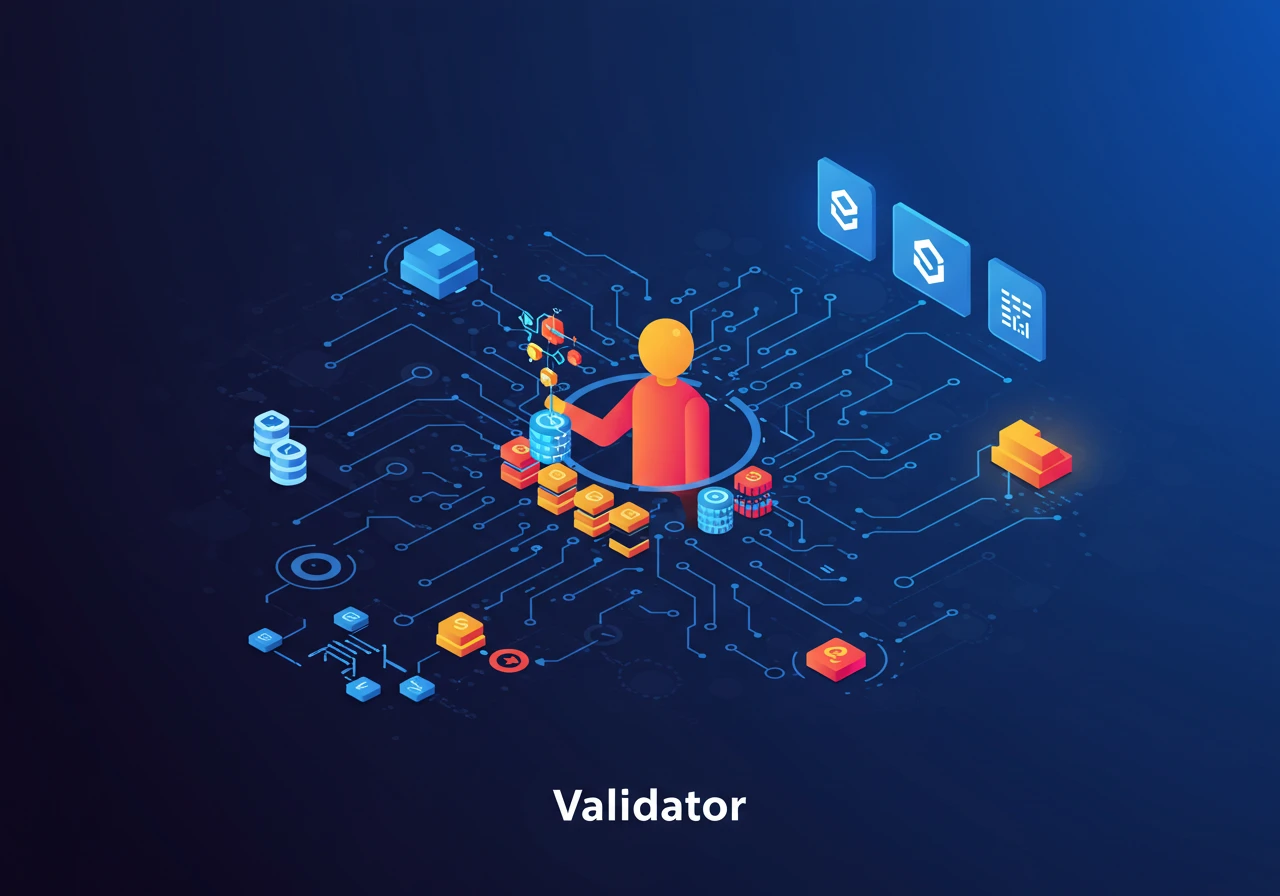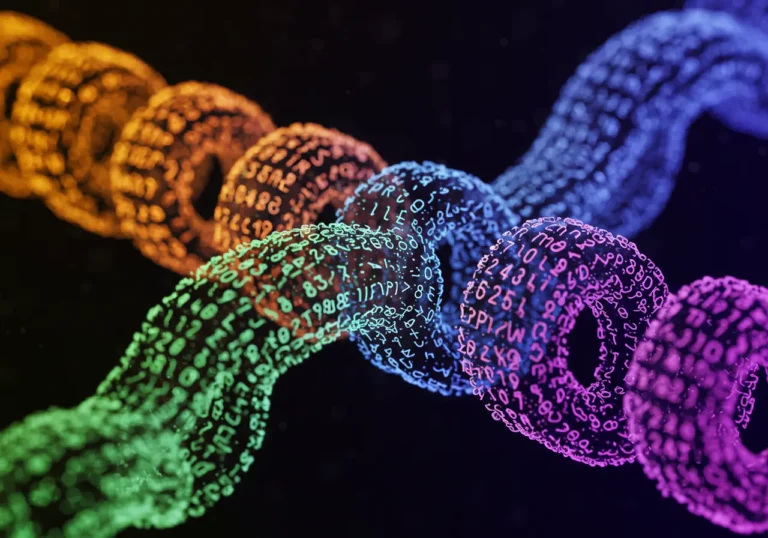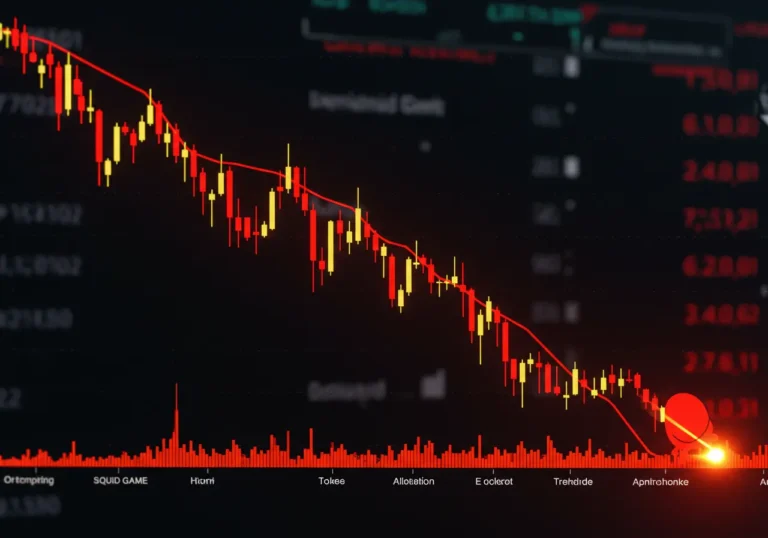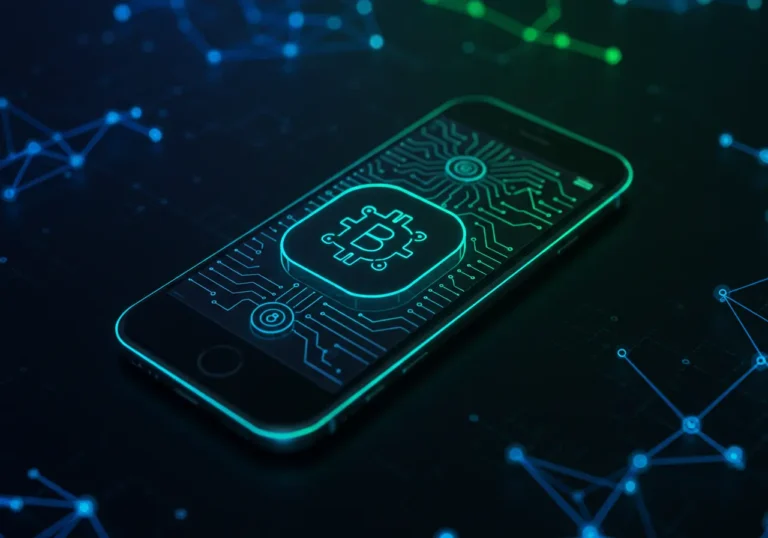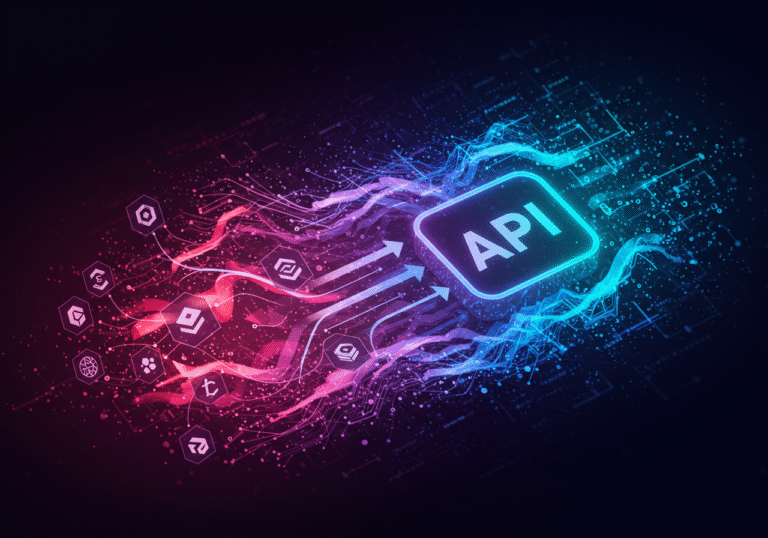What is the Role of a Validator in a Blockchain Network?
Validator nodes are at the heart of many modern blockchains. They validate transactions, help secure the network, and sometimes make decisions about upgrades. Below I lay out the core responsibilities of a validator, the importance of validator in blockchain systems, how they protect networks, and what it looks like to run or pick a validator.
Validator: the simple idea
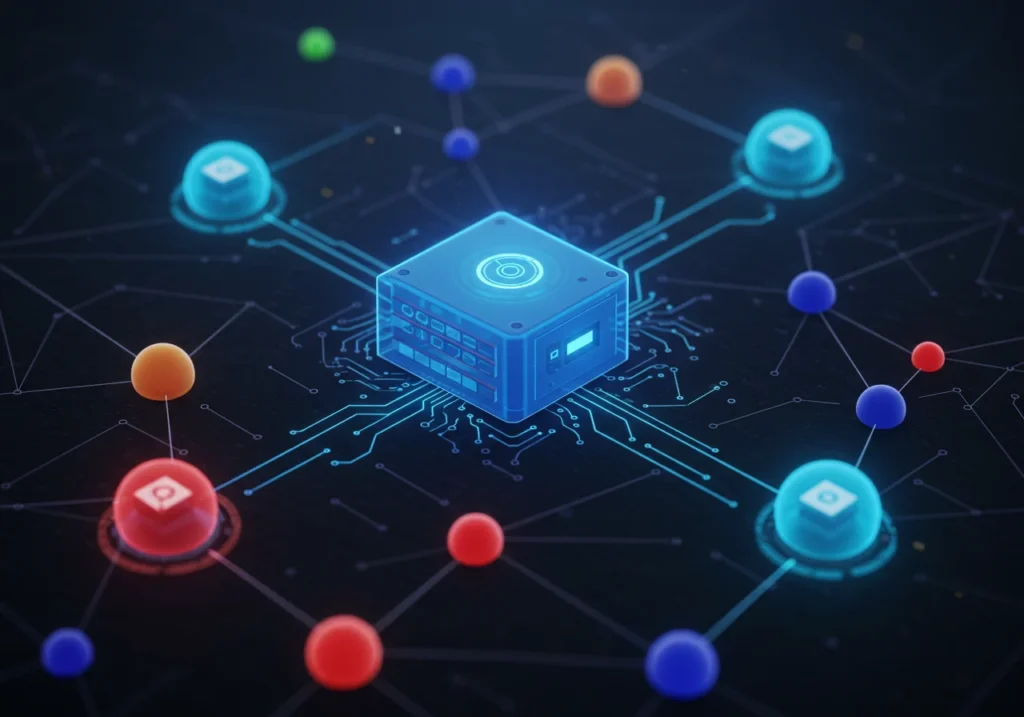
Validator is the name for the players that propose and confirm new blocks of transactions on blockchains that use proof-based systems like Proof of Stake. Imagine a town meeting where a rotating group of neighbors checks everyone’s receipts and agrees what the town ledger should show. Validators do that checking. They confirm transactions are real and add them to the chain.
What validators are not
They are not bosses. They do not own the network. The system rules — the software and the consensus protocol — limit what validators can do. If a validator misbehaves, the protocol can punish it. That checks power and keeps the system honest.
Core responsibilities of a validator
The responsibilities of a validator are easy to list and important to understand:
- Verify transactions: Confirm that each transaction follows the rules (the sender had enough funds, signatures match).
- Propose and finalize blocks: Bundle valid transactions into a block and propose it to the network, then help finalize the block once the group reaches agreement.
- Maintain uptime and reliability: Run servers that are online, fast, and secure so they can participate when chosen.
- Sign messages correctly: Use private keys safely to sign blocks and votes; bad signatures can lead to penalties.
- Participate in governance (sometimes): Vote on protocol changes, parameter updates, or upgrades depending on the network.
- Report or handle misbehavior: Observe the network and act if other validators behave maliciously or if software needs patching.
These tasks sound small, but together they power the whole system and are central to the validator’s role in network security.
Why validators matter: the importance of validator in blockchain
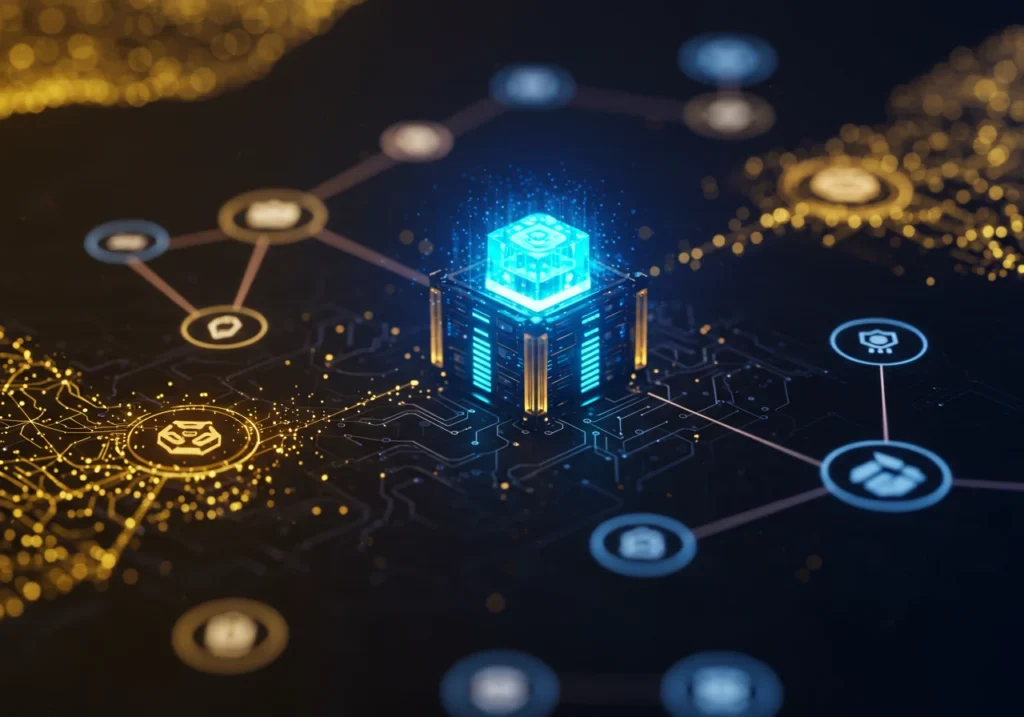
Validators are the honest witnesses of the blockchain. Without them, transactions could be forged, and the ledger would lose value. Their work provides:
- Security: Validators check that transactions are legitimate. If most validators are honest, attackers cannot change history easily.
- Finality: When validators agree, users can trust that a transaction is final and cannot be reversed easily.
- Decentralization: Many independent validators spread across regions make the network resilient to censorship and outages.
- Incentive alignment: Validators often stake tokens. They have skin in the game, which aligns their interest with the network’s health.
The validator’s impact on decentralized systems is large because their behavior determines whether the network stays trustworthy and functional.
How validators secure a network: the mechanics
The exact details differ by protocol, but the general pattern is similar:
- Selection: The protocol selects a validator (or group of validators) to propose the next block. Selection may depend on stake size, randomness, or voting.
- Proposal: The selected validator builds a block from pending transactions.
- Voting/Endorsement: Other validators check the block and vote to accept it. When enough votes are collected, the block becomes final.
- Rewards and penalties: Honest work earns rewards (new tokens, fees). Misbehavior or downtime can lead to penalties or slashing — losing part of the stake.
These incentives — reward for good behavior, penalty for bad — are central to the validator’s duties in blockchain technology.
Running a validator: what it takes
Running a validator is not just clicking a button. It requires some technical work and careful attention.
Hardware and connectivity
Validators need reliable hardware and a fast, stable internet connection. They must be online almost all the time to avoid missed duties and penalties.
Security practices
Keep private keys off the internet when possible (use hardware security modules or cold keys). Protect the server from malware and unauthorized access. Regularly update and patch software.
Monitoring and backups
Set up monitoring to alert you if the node is down or behaving oddly. Keep backups of configurations and recovery plans.
Capital and stake
Validators often must lock tokens as collateral. Running a validator means putting real value at stake. The amount varies by network.
When done well, running a validator can be rewarding both technically and financially. When done poorly, it risks penalties and loss.
Delegation and staking: shared responsibilities
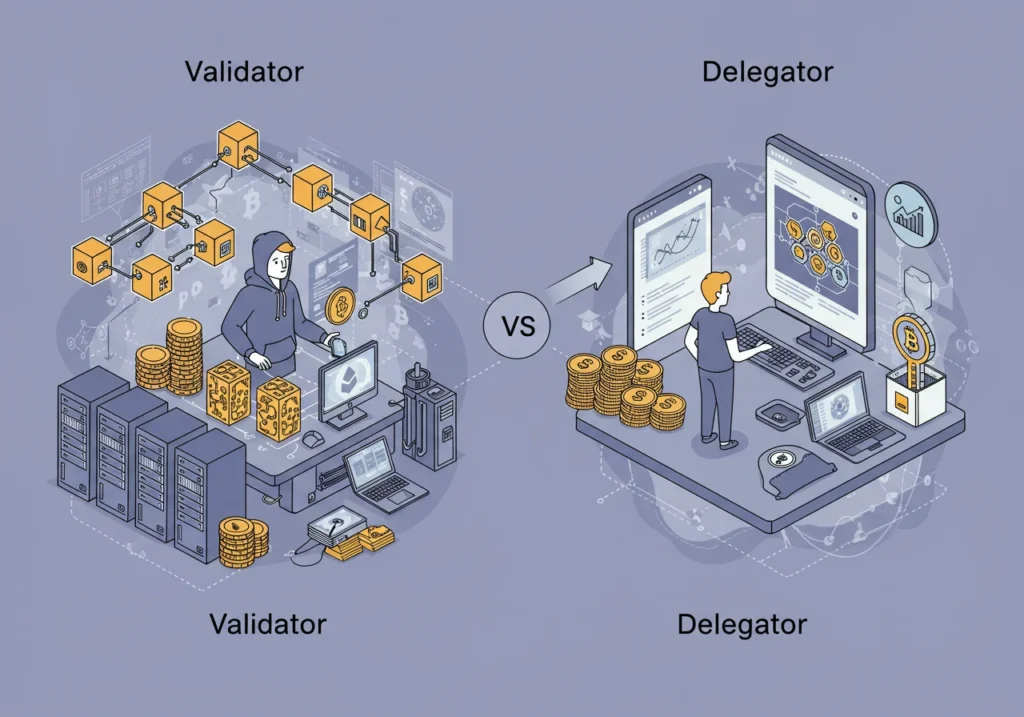
Not all participants want to run a validator. Many networks allow delegation, where token holders delegate their stake to a validator and share rewards. This helps decentralize participation while letting experts handle the technical work.
Delegators should choose validators carefully. Look for:
- Uptime history and reliability.
- Transparent team and good communication.
- Fair fee rates and reasonable commission.
- Security practices and reputational history.
Delegation spreads risk and helps newcomers participate without managing servers.
Risks and penalties: why validators must be careful
Validators face clear risks:
- Slashing: If a validator signs two conflicting blocks or acts maliciously, the protocol can slash (destroy) part of its stake.
- Downtime penalties: Missing duties or being offline can reduce rewards or trigger penalties.
- Security breaches: A compromised private key means attackers can sign blocks and cause slashing.
- Operational mistakes: Misconfiguration can cause loss of rewards or ejection from validator sets.
These risks underline the need for good validator’s role in network security and responsible operation.
The social side: reputation and governance
Validators are also social actors. They communicate with the community, propose improvements, and may form working groups. A transparent validator builds trust. Many networks have governance systems where validators vote on changes — that is where the importance of validator in blockchain becomes directly political and practical.
Validators that listen to the community and act in the network’s interest strengthen the system overall.
Types of validators and selection methods
Different blockchains use different validator systems:
- Proof of Stake (PoS): Validators stake tokens and are often selected in proportion to stake and randomness.
- Delegated Proof of Stake (DPoS): Token holders vote delegates into a smaller set of active validators. This can be faster but more centralized.
- Proof of Authority (PoA): Known, trusted validators (often for private or consortium chains) provide fast finality but require trust.
Each system trades off decentralization, speed, and ease of participation.
How validators affect decentralization and resilience
A network with many independent validators across regions is harder to attack and less likely to be censored. Concentration of stake into a few validators is a risk: it reduces resilience and may lead to collusion. Healthy validator ecosystems work to balance performance and broad participation.
How to choose a validator (if you delegate)
If you plan to delegate, use this quick checklist:
- Check uptime and historical performance.
- Read community feedback and validator transparency reports.
- Look for security measures: hardware keys, audits, and redundancy.
- Understand fees and bonding/unbonding periods.
- Prefer validators that participate in governance and community support.
Choosing well protects your stake and supports network health.
Common misconceptions
- Validators are the same as miners. Not always. Mining is for Proof of Work systems; validators are central to Proof of Stake and related systems.
- Validators control the network. They do not own the network. Protocol rules and token holders limit power.
- Running a validator is passive. It can be active and risky; good operations matter.
Conclusion — small workers, big impact
A Validator is a guardian of trust in a blockchain network. Their everyday work — checking transactions, proposing blocks, voting — is not glamorous but it is essential. Good validators combine technical skill, careful security, and honest behavior. They protect funds, ensure finality, and help keep decentralized systems resilient.
If you want to support a network, you can run a validator or delegate to one you trust. Either way, paying attention to the validator’s duties in blockchain technology and the validator’s impact on decentralized systems helps the whole ecosystem stay strong.
Main takeaways
- Validator nodes verify transactions, propose blocks, and help finalize the blockchain.
- Responsibilities of a validator include uptime, correct signing, and secure key management.
- The importance of validator in blockchain lies in network security, finality, and decentralization.
- Validators earn rewards but face risks like slashing and downtime penalties.
- Delegation allows token holders to support validators without running nodes.
- Choose validators with good uptime, transparency, and strong security practices.
- Validators influence governance and the long-term health of decentralized systems.
Frequently Asked Questions
Q: Can anyone become a validator?
A: It depends on the network. Many Proof of Stake networks require a minimum stake and technical setup. Some networks allow anyone to run a node but only active validators with sufficient stake participate in consensus.
Q: What is slashing and why does it matter?
A: Slashing is a penalty that reduces a validator’s stake if it misbehaves (e.g., signs conflicting blocks or is repeatedly offline). It protects the network by making attacks costly.
Q: How long does it take to withdraw staked tokens?
A: Unbonding times vary by network — from a few days to weeks — to give the network time to react and prevent quick exits after malicious behavior.
Q: Are validators paid?
A: Yes. Validators receive rewards such as transaction fees and block rewards. The exact mechanics depend on the protocol.
Q: How do validators coordinate on upgrades?
A: They participate in governance mechanisms: voting on proposals, testing upgrades, and communicating with developers and the community.
Table of Contents

Hello, I’m Edmilson Dias, founder of CoinBringer. I created this platform to guide people through the fast-moving world of cryptocurrency with clarity and safety. With years of research in blockchain and digital security, my goal is to translate complex topics into practical knowledge, offering reliable tutorials, safety insights, and guidance for both newcomers and experienced users.
Discover more from CoinBringer
Subscribe to get the latest posts sent to your email.

